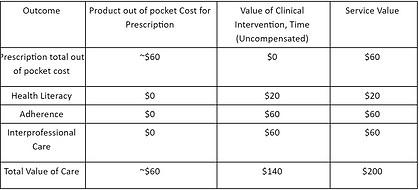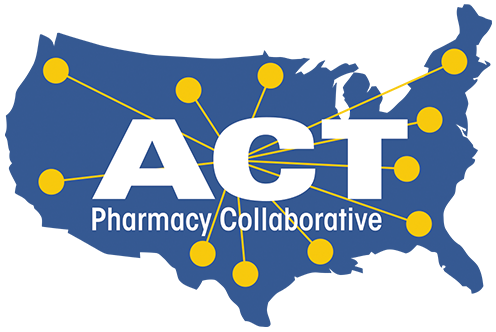About the Pharmacy
Maryville Pharmacy
Maryville, IL
www.maryvillepharmacy.com
Meet the Team
Pharmacist Lead Contact:
- Harry Zollars, PharmD
Faculty Lead Contact:
- Miranda Wilhelm, PharmD
Student Pharmacist:
- Sara Rhymer
Description of Pharmacy
Maryville Pharmacy is a single entity family-owned, independent pharmacy serving the Saint Louis Metro East in Madison County, IL. The pharmacy performs a wide range of services, including but not limited to traditional pharmacy dispensing, compounded/customized prescriptions, adherence packaging, medical equipment sales and prescriptions, advanced wound care products, bracing products, compression garment products, mastectomy-related products and counseling, delivery services, 24-hour access, 340b dispensing, and much more.
Maryville Pharmacy also allows for the improved access to patients who are uninsured or underinsured to decrease the financial burden for some life-saving medications, especially for those living with type 2 diabetes. A large population of English as a Second Language (ESL) patients who use 340b clinics for their healthcare seek services that can help address their health literacy needs on top of easing the financial burden of prescription medications, much of which may be left unmet. Maryville Pharmacy has been a contract pharmacy with the 340b Federally Qualified Health Center for more than 5 years and have developed a cordial and productive relationship with the local clinic and their providers.
Pharmacy Story
Initial Presentation:
A 54yo female patient (JC) came to Maryville Pharmacy to pick up new prescriptions prescribed by a 340b clinic from a nearby town. While filling medications for diabetes, the pharmacist noted that the patient primarily spoke Spanish and spoke English as a second language. The patient had difficulty asking questions and trouble understanding the instructions on the labels. The pharmacist offered to counsel in Spanish with the patient’s permission and took prescriptions back to redo the labels and writing in the appropriate language. The patient initially recognized the insulin but was not familiar with the “pen” devices.
Background:
JC’s provider had prescribed:
- Levemir 100 units/ml pens 60 units daily for treatment of diabetes mellitus
- Jardiance 25 mg for treatment of diabetes mellitus
- Amlodipine 10 mg for treatment of hypertension
- Simvastatin 80 mg for treatment of hypercholesterolemia
- Fluoxetine 20 mg for treatment of moderate depressive disorder
- Previous history showed prior use of insulin in vials, a trial of Zestril 20mg daily, Zocor 40mg nightly, and occasional treatments for antibiotics/antifungals (many treatments around diabetes treatment put on hold due to financial constraints according to pharmacy database)
Patient Report:
The patient reported:
- Lack of knowledge of indications for non-insulin products.
- No supplies for testing blood glucose or any samples of pen needles for Levemir.
- No reported symptoms of hypoglycemia or any other pressing concerns.
Physical Observation:
Pharmacist observed that patient was overwhelmed and confused about treatment for medications overall and needed time to counsel for what each medication would do.
Intervention:
1. Education: Using basic Spanish, pharmacist counseled patient on directions for Levemir insulin, injection technique, disposal and hygiene around injections, risk of low blood sugar and measures for what to do if it happens. All other medications discussed with indications, directions, and side effects.
2. Provider Consult: Pharmacist called provider for new prescriptions for needles and testing supplies for blood glucose. In speaking with nurse, pharmacist advised that most often switching between insulin vials and pens can be confusing with patients and that ancillary supplies should be considered. Counseling on insulin pen use hygiene also performed. Needles provided to patient as well as testing supplies.
3. Follow Up: Pharmacist would determine use of testing supplies and knowledge base growth for how blood glucose was taken as well as indications/side effects of new medications.
Outcomes of Care Provided:
Outcome 1: Health Literacy
With pharmacist intervention of counseling in patient’s preferred language, patient would have received more direct information about the purpose of treatment and the likelihood of side effects.
- The pharmacist asked the patient, “Do you have trouble at other pharmacies to understand what your medications are for?” She reported “There’s no other pharmacies that are willing to help communicate in Spanish with me. It also takes a lot of my time and energy to translate prescriptions when I get home.”
Outcome 2: Adherence – Diabetes
Pharmacy staff worked to improve adherence with workflow measures to allow for better adherence and to more easily accommodate the patient’s lifestyle.
- JC got her medications by a pharmacist on the next visit to promote regular adherence to medications prescribed.
Outcome 3: Inter-Professional Care
Clear and direct communication between staff at clinic and pharmacy allowed for optimal care for patient. Should in the future there be collaborative practice agreements be made, pharmacy staff could auto-initiate prescriptions to help fill gaps in therapy that are common with diabetes like the use of pen needles with insulin pens or to provide testing supplies when not provided at the clinic.

State/Federal Connections/Advocacy/Impact:
The care provided to JC was made possible through Maryville Pharmacy’s participation in the Illinois Community Pharmacy Enhanced Network (I-CPEN), Illinois’ CPESN USA network. The Illinois Pharmacists Association as well as Southern Illinois University Edwardsville School of Pharmacy also provide many resources and knowledge bases for pharmacies and patients in the area. Maryville Pharmacy and other independent, family-owned pharmacies are important access points for patients from many lifestyles to provide personalized care at all health literacies, much of which are provided in extremely trying times during the COVID-19 pandemic.

